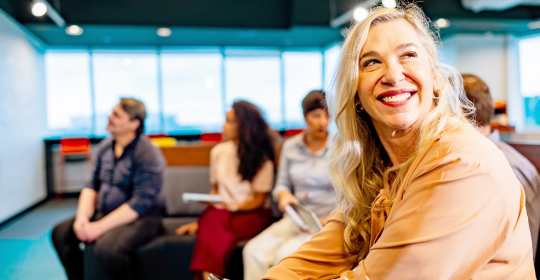With Linked-in groups used for hiring and for exchange of ideas, and more team collaboration carried out in the ‘cloud’, is there any need for a central corporate office? Dispersed working is more common, and while some face-face time will always be essential for in-depth discussions and to build up trust, more organisations are keeping these to the minimum.
Teamwork is becoming more complex as well as more virtual. There has been a three-fold increase in the number of projects for each employee in the past five years, according to an in-depth survey of 1,130 senior international business managers, carried out by JB Associates in association with Regus. Some 18% of businesses now use ‘services cloud’ model – real-time, online collaboration on projects by dispersed teams using multi-media – and this is the fastest growing model of business communication.
For a large number of workers, especially knowledge workers and those in global businesses, there is no need for a conventional commute to a traditional office. This smarter way of working enables more autonomy in terms of both location and hours.
Businesses are moving away from fixed location, static teams, rigid silos and a command-and-control management approach. Globalised trade is one factor, but environmental and cost pressures are others. High oil prices call into question many commuting arrangements, and the practice of flying executives from all over the world for a meeting that could be managed via video-conference – a medium that is improving in quality.
This shift in the working life – towards an environment that is more international, dispersed, team-based, complex and virtual – is a profound shift in our ways of working. It means close cooperation between departments that may previously have been in separate departments or ‘silos’ – for example, IT, human resources and property – so that they can create environments that support remote team workers rather than force them together. Increasingly, an organisation’s office is a meeting hub, rather than the all-purpose prestigious head office.
Says Michelle Brailsford, organizational and people development consultant at the BBC: ‘People work from home, hot spots, coffee shops or offices if they prefer. Teams come together when it is necessary to get a result, otherwise, they operate virtually.’ It is, she says, a ‘results-only working environment’, or ROWE – and it is rapidly becoming the norm, especially in the US.
Dispersed teams do not just organise themselves; at least as much thought and planning has to go into their design as to any similar initiative in a traditional office. There have to be clear contracts, performance measures and transparent accountability.
Trust has to be very high to ensure effective working of dispersed teams – but then, trust has always been important. Arguably, it was too often complacently assumed that co-workers sat near each other communicated effectively, trusted one another and cooperated well. Everyone can think of traditional environments where that was not the case. What remote working has done is expose the centrality of trust to making any organization function.
John Blackwell, founder of JB Associates, a specialist in smartworking, says that with conventional approaches, it is often an arbitrary choice as to the situation in which the manager trusts the staff or not. Traditionally, he points out, we ’are not trusted to choose when and where we work, but if you are asked to get up early and catch a train to Harrogate, no executives will be there are the departing train station to make sure you catch the train.’
Ultimately, if the managers do not trust the staff, there is a problem with hiring, or performance, that needs attending to – irrespective of where people are located, geographically.
Chris Mellor, deputy chair of the NHS regulator Monitor, and a former CEO of Anglian Water, says the culture of trust is essential for any organization, whether located on one site or dispersed globally, and that the business leaders must set the example: ‘I am a firm believer, particularly in large organisations, that it all starts at the top. What you have to do is create a functioning team at the top, based on the principles of openness and transparency – getting the truth on the table; including things that are wrong.
‘If you get it right and you get people with the right behaviours; encouraging people to reveal mistakes and learn from them; that behaviour cascades down the organisation, as does the knowledge that the role of the line manager is to communicate.’
Research indicates that high-trust organisations that are continually adapting are more resilient. Studies by JB Associates show that higher performing businesses are better at managing change. The research also shows that such high-performing businesses regard change as a constant state of affairs, and devote more time and attention to building trust. Whether these attributes are cause or effect of better performance can be debated, but it is most likely that it is a self-reinforcing positive cycle.
Trust is key to making a remote team work – but it is a need that has always been there.






